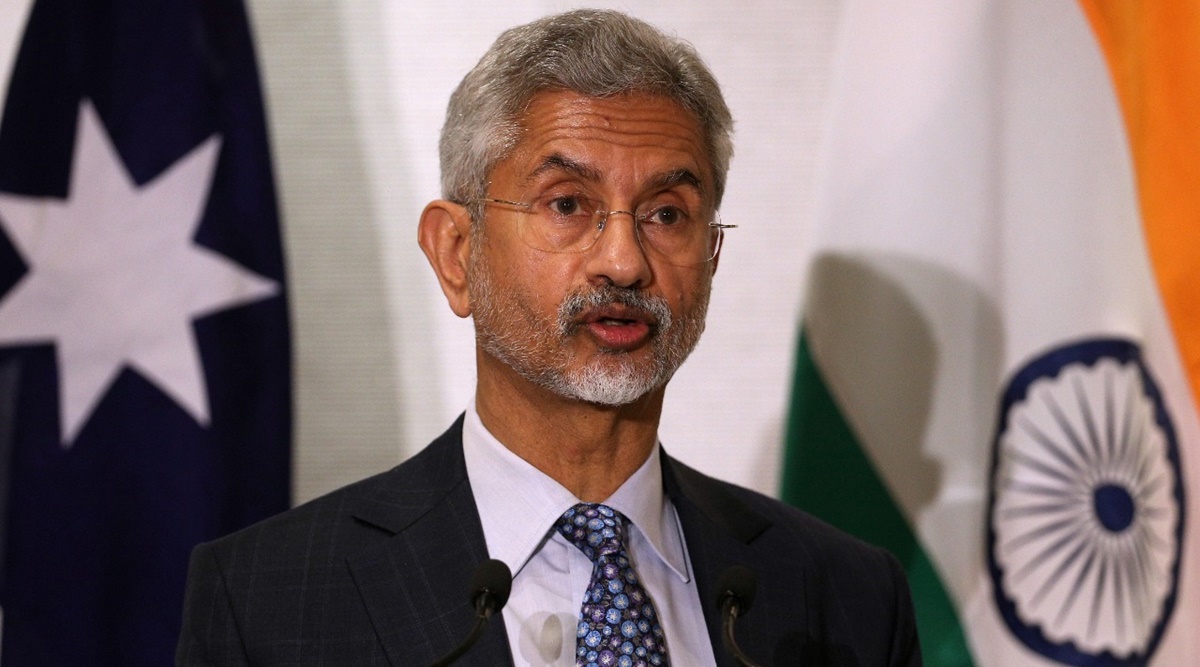 Foreign Minister S Jaishankar addresses a press conference in Melbourne on Saturday. (Photo: AP)
Foreign Minister S Jaishankar addresses a press conference in Melbourne on Saturday. (Photo: AP) Australian Foreign Minister Marise Payne by his side, External Affairs Minister S Jaishankar slammed China Saturday for “disregarding” the “written agreements” with India on not massing troops at the border and said it is “an issue of legitimate concern for the entire international community”.
Holding Beijing responsible for the current situation along the Line of Actual Control, Jaishankar, responding to a question after a bilateral sitting with Payne a day after the meeting of Foreign Ministers of the Quad countries in Melbourne, said: “Yes, we had a discussion on India-China relations, because it was part of how we briefed each other about what was happening in our neighbourhood.”
“And it’s an issue in which a lot of countries legitimately take interest, particularly if they are from the Indo-Pacific region. And because the situation has arisen due to the disregard by China in 2020 of written agreements with us, not to amass forces at the border. So when a large country disregards written commitments, I think it’s an issue of legitimate concern for the entire international community,” he said.
On Beijing’s criticism of the Quad, Jaishankar said China has been taking this line for some time and criticising the Quad grouping repeatedly “doesn’t make the grouping less credible”.
These sharp remarks from the External Affairs Minister — he is usually very diplomatic in his choice of words, especially on China, more so while speaking from foreign soil — reflect Delhi’s frustration over Beijing’s behaviour ever since the start of the military standoff along the Ladakh frontier in May 2020.
India and China have had several rounds of meetings, but the standoff has still not been resolved. While the border situation has impacted the relationship, trade has increased, underlining the degree of dependence on China’s manufacturing.
On the Quad and China’s criticism of the grouping, Payne said: “We are not against anything. We are about building confidence and resilience, about promoting a region in which all countries are able to be and feel sovereign and secure without the threat of coercion or intimidation.” This was an oblique reference to China’s actions at the LAC, and in the Indo-Pacific region.
While Jaishankar and Payne agreed on the Chinese behaviour along the LAC, there were divergences in their public statements on the Russia-Ukraine situation.
Responding to questions on Russia’s actions along the Ukrainian border, Jaishankar said “diplomacy is the only way out”. He did not criticise the Russians for massing troops along the Ukrainian border, triggering fears of a conflict.
Payne, however, was critical of the Russian behaviour and voiced “concern” over the “extraordinary unilateral action” by Russia. She expressed “support” for “Ukraine’s sovereignty and territorial integrity”.
The two Foreign Ministers held a meeting on cyber security as well.
A joint statement on the cyber security dialogue said the ministers reiterated their commitment to secure, resilient and trusted technology and agreed to work together to “address the significant threat of malicious cyber activity by state and non-state actors”.
They acknowledged the importance of the security and resilience of telecommunications networks and the need to work closely with each other to protect next generation telecommunications networks, including 5G and 6G, it said.
This also assumes significance in the wake of Chinese players in the cyber space being shunned by many countries, including Australia and India, for strategic reasons. India’s ban of Chinese mobile apps, including the popular Tik Tok app, was done with this rationale in mind.
Recognising the importance of working collaboratively with international partners, the statement said the ministers agreed to undertake joint engagement with Indo-Pacific partners to collaboratively improve the region’s cyber capabilities.
- The Indian Express website has been rated GREEN for its credibility and trustworthiness by Newsguard, a global service that rates news sources for their journalistic standards.

